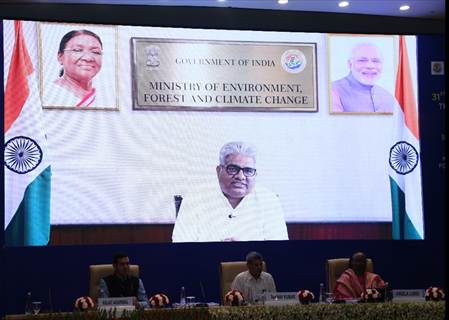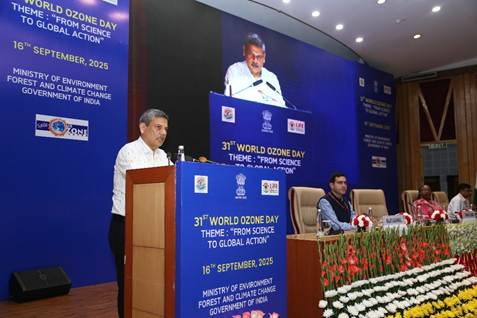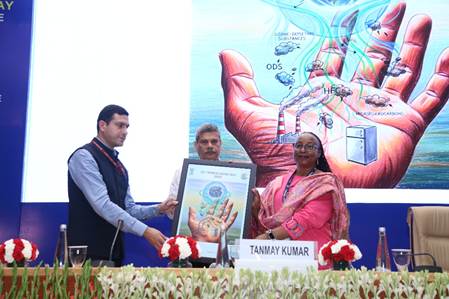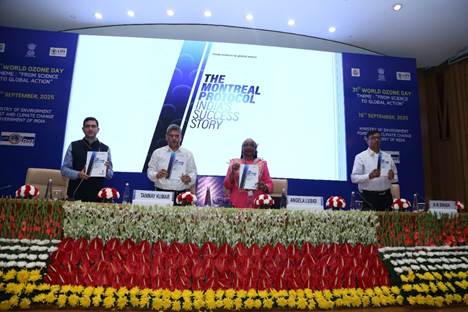Ministry of Environment, Forest and Climate Change
MoEFCC celebrated 31st World Ozone Day to commemorate the signing of the Montreal Protocol
Under PM Shri Narendra Modi’s leadership, India Cooling Action Plan (ICAP) demonstrates high Inter-Ministerial and Cross-Sectoral Collaboration in laying out actionable pathways: Shri Bhupender Yadav
India achieved 67.5% reduction target in HCFC production and consumption and a complete phase-out of HCFC-141b: UNDP Resident Representative in India, Ms. Angela Lusigi
Posted On:
16 SEP 2025 5:41PM by PIB Delhi
The Union Ministry of Environment, Forest and Climate Change (MoEF&CC) organized the 31st World Ozone Day in New Delhi today. The theme for World Ozone Day 2025 is ‘From science to global action’, emphasizing the power of scientific discovery to assist policy formulation and inspire international cooperation, demonstrating that collective action based on scientific evidence can protect our planet and its future. The event was graced by Secretary (MoEFCC), Shri Tanmay Kumar, and Resident Representative of the United Nations Development Programme (UNDP) in India, Ms. Angela Lusigi.

Addressing the event through pre-recorded message, Union Minister for Environment, Forest and Climate Change, Shri Bhupender Yadav said that under the Montreal Protocol, scientists and industry worked together to eliminate 99 per cent of all ozone-depleting substances, due to which the ozone layer is healing. By regulating the production and use of Ozone Depleting Substances, the Montreal Protocol has significantly contributed to the Climate Change.
The Minister also said that under the leadership of Prime Minister Shri Narendra Modi, the India Cooling Action Plan (ICAP) development and implementation framework demonstrates high inter-ministerial and cross-sectoral collaboration in laying out actionable pathways. It provides sustainable cooling to meet cooling needs while neutralizing its negative impacts. Shri Yadav further highlighted the steps taken by the Ministry towards promoting of indigenous development of low global warming potential (low-GWP) refrigerants including collaboration with the Indian Institutes of Technology.
Addressing the participants, Secretary (MoEFCC) Shri Tanmay Kumar, said that the environmental perspective should be viewed in totality including in solving problems relating to various environmental issues. The Montreal Protocol demonstrated that collective action based on scientific evidence can protect our planet and its future. He also said the initiative of providing training equipment to the Industrial Training Institutes will lead to development of skilled work force in the country in the Refrigeration and Air conditioning sector.

Shri Kumar further highlighted other initiatives taken by the Ministry, including mission LiFE (Lifestyle for Environment), a campaign to promote and encourage a sustainable and environmentally conscious way of living through mindful choices and decision in daily life towards and environment conscious lifestyle. He also emphasized the importance of the flagship initiative of the Prime Minister, ‘Ek Ped maa ke naam’, which is very vital for a sustainable future and protection of planet Earth. Welcoming the participants, Joint Secretary, MoEFCC Shri Rajat Agarwal highlighted the importance of Montreal Protocol in protection of the Ozone Layer.
Addressing the gathering, Ms. Angela Lusigi recalled that World Ozone Day marks one of the most successful examples of global cooperation under the Montreal Protocol. She appreciated India’s achievement of a 67.5% reduction target in HCFC production and consumption from its baseline; and the complete phase-out of HCFC-141b in 2020. She also underscored UNDP’s support to MoEFCC in equipping 120 Industrial Training Institutes with advanced tools for refrigeration and air conditioning training, linking ozone protection with green skills, jobs, and livelihoods.
Key Highlights of the World Ozone Day 2025
- Refrigeration and Airconditioning (RAC) Training Equipment provided to Industrial Training Institutes (ITIs)
The MoEFCC, Government of India, in close cooperation with the Directorate General of Training (DGT), Ministry of Skill Development and Entrepreneurship (MSDE), is providing Refrigeration and Air conditioning (RAC) Training equipment to 120 Industrial Training Institutes (ITIs) across the country, considering the institutes having RAC trade and geographical balance covering all the States/Union Territories.
The training equipment will enable the ITIs to train RAC trade students and prepare them for installation and maintenance of the equipment using best practices. This includes handling low global warming potential (GWP) refrigerants, that have issues relating to flammability, toxicity and safety, and enhancing their skills and competencies. In addition, it will help in development of skilled work force in the country in the RAC sector, considering industry requirements during the ongoing HCFC phase out and the HFC phase down, which is to be implemented as part of the Kigali Amendment to the Montreal protocol 2028 onwards.
- Short video film released on ‘Refrigeration and Air conditioning (RAC) Training Equipment Support to Industrial Training Institutes (ITIs)’
- Release of Awareness Materials
- Release of winning poster entry and announcement of winning entries from the online National level Poster and Slogan competitions for school children.
To create awareness among the students to protect the Ozone Layer, online National level competitions in the category of Poster making and Slogan writing were organized for school children across the country, in collaboration with National Museum of Natural History (NMNH), Ministry of Environment, Forest and Climate Change. 6,322 entries were received for the poster competition and 2,428 entries for the slogan category respectively through an exclusive web portal developed for the purpose. The winning entries were finalized by a panel of judges. The winning Poster was released by the Chief Guest. In addition, other winning entries in the poster and slogan categories were announced

- 27th edition of ‘The Montreal Protocol: India’s Success Story’ was released, highlighting India’s achievements in the Montreal Protocol Implementation.

- Release of Publications
- Study on Techno Economic Feasibility of District Cooling System (DCS) in India. The study assesses the techno economic feasibility of adoption of DCS in different climatic zones of the country, vis-à-vis conventional cooling systems.
- Study on Low Global Warming Potential (GWP) alternative technologies for chillers in large air conditioning buildings. The study assesses the use of chillers with low GWP technologies in large buildings for meeting the cooling requirements in a sustainable way.
- Study on Best Practices for Installation and Maintenance of Ammonia/Low Global Warming Potential alternative technologies in Cold Chain. The study focusses on the sustainable practices for setting up and management of cold chain infrastructure with low GWP alternatives.
- Study on Low GWP Technologies in the Transport Refrigeration Sector. The study assesses the feasibility of adoption of low GWP technologies in the transport refrigeration and proposes measures for promoting their adoption.
*****
VM/SK
(Release ID: 2167243)
Visitor Counter : 951